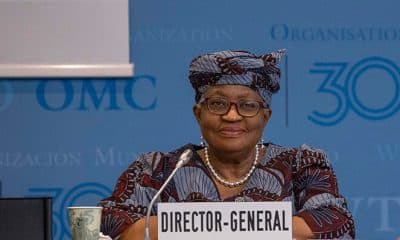Business
Food Crisis: Okonjo-Iweala Reveals Reason Behind Nigeria’s Agricultural Exports Collapse

The Director-General of the World Trade Organisation (WTO), Dr. Ngozi Okonjo-Iweala, has stated that Nigeria’s agricultural exports dropped sharply when the country began prioritizing the exploitation of petroleum resources, despite its previous success as a major agricultural exporter.
Naija News reports that the ex-Minister of Finance mentioned this while introducing the $1.2 million plan to upgrade Nigeria’s sesame and cowpea products for international trade.
Okonjo-Iweala pointed out that Nigeria’s farming could produce many different things to sell and create jobs, but it’s not working because of problems.
She highlighted Nigeria’s historical significance as an exporter of agricultural products such as palm kernel, groundnuts, palm oil, cotton, and cocoa.
However, she noted that Nigeria has become a net importer of many of these goods. This shift has led to significant financial outflows, with Nigeria spending billions annually on imported goods that it could potentially produce domestically.
She pointed out that Nigeria’s status as a major agricultural exporter declined as the economy increasingly focused on petroleum exploitation.
Okonjo-Iweala said, “We all know the story about Nigeria being a significant exporter of palm kernel, groundnuts, palm oil, cotton and cocoa, but the country has since become a net importer of many of these goods.
“In fact, Nigeria has not only lost out in agricultural export markets, it is a net food importer spending about billions a year for goods, many of which we can also produce here.
“Nigeria used to be a formidable agricultural exporter. Up to the mid-1960s, the country’s share of world agricultural exports was more than one per cent.
“However, agricultural exports collapsed as the economy shifted towards petroleum exploitation, and by the mid-1980s Nigeria’s world market share for agricultural products has dwindled to less than 0.1 per cent.”
The director-general emphasized that Nigeria’s untapped potential in trade is partly due to supply-side issues, which the project aims to tackle.
She highlighted Nigeria’s significant role in global cowpea and sesame production and exportation but noted that exports face challenges due to not meeting Standard Phytosanitary Measures (SPS) requirements.








